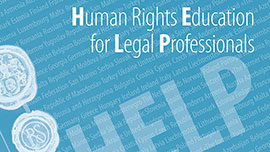Regional project : Combatting ill-treatment and impunity

The target groups included prosecutors, law enforcement officials, staff of supervisory, investigative and complaints handling structures, judges, lawyers, high level representatives and legal staff of executive and legislative institutions, legal staff of Ombudsman institutions, OPCAT bodies and NGOs.
The main objectives were to develop national capacities for combating ill-treatment by law enforcement agencies and investigative institutions, including strengthening the effectiveness of investigations of allegations of ill-treatment, through the improvement of the regulatory framework and institutional/operational systems for the prevention of ill-treatment and effective investigation of complaints, leading to imposition of sanctions, based on European and international human rights norms and standards, and the strengthening of the capacity of key groups of legal professionals to apply these standards in their daily work.
The following outputs were delivered and results were achieved:
- Negotiations and reinforced dialogue in all five beneficiary countries with the national partners who confirmed their commitment, and the state partners, who were willing in general to deal with this issue and to contribute to achieving the Project’s objectives (although some hesitations from the Ministries of Interior).
- Concerning the improvement of the regulatory framework, procedures and mechanisms:
- Country Reports served as a basis for action by the authorities to undertake concrete legislative and structural amendments, and ensure the concrete implementation of the recommendations.
- No improvement of the internal regulatory framework in the key institutions. However, structural and legislative changes have proven to be a difficult task in the long-term, and the Project has not so far resulted in the establishment of fully independent investigative mechanisms.
- Concerning the application of European standards by legal professionals in their daily work:
- Training of key groups of legal professionals, including judges, prosecutors and investigators, lawyers, law enforcement officers, Ombudsman institutions and human rights NGOs, with the support of the partner institutions.
- Awareness on the application of the ECHR and CPT standards, and the ECtHR case law.
- Training on the regulatory framework, procedures and mechanisms for the effective investigation of allegations of ill-treatment in their respective countries.
- Successful training sessions have produced the necessary potential for future behavioural change in the beneficiary countries from ill-treatment.
- Clear trend of increasing convictions of law enforcement officials in the beneficiary countries.
- A number of court rulings have referred directly to the ECHR.
The Council of Europe ensured the follow up on these initiatives to implement the recommendations, in particular through a new Joint Programme between the European Union and the Council of Europe entitled “Reinforcing the fight against ill-treatment and impunity” (1 July 2011 – 31 March 2014).
Project information
- Duration: 30 months (01 January 2009 – 30 June 2011)
- Place/ country: Armenia, Azerbaijan, Georgia, Moldova and Ukraine
- Budget: 1 900 000 €
- Funding: European Union/Council of Europe Joint Programme (European Instrument for Democracy and Human Rights)
Project documentation




